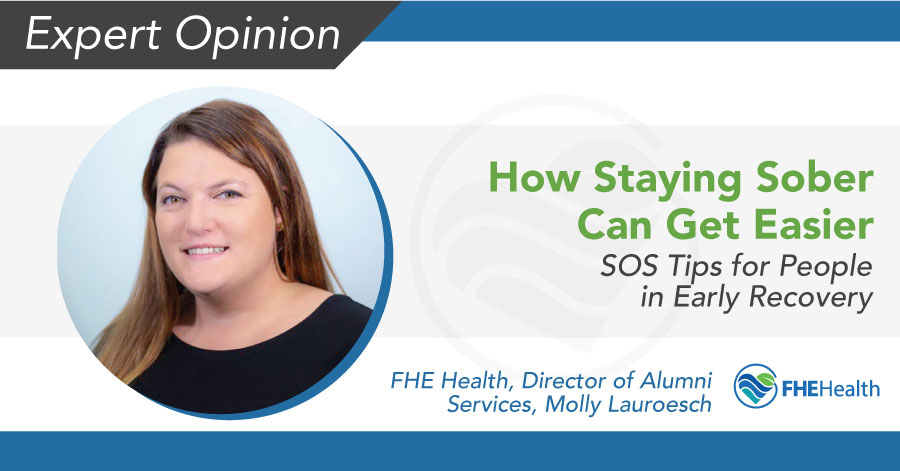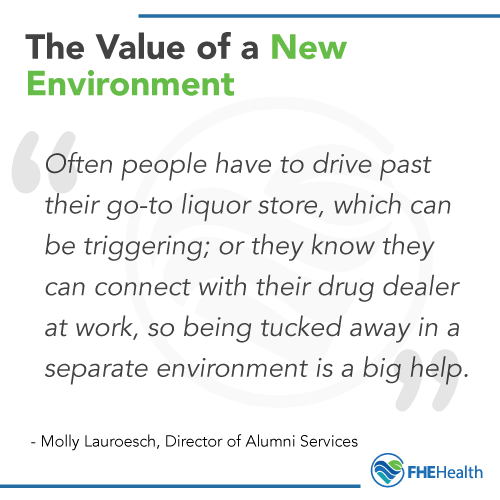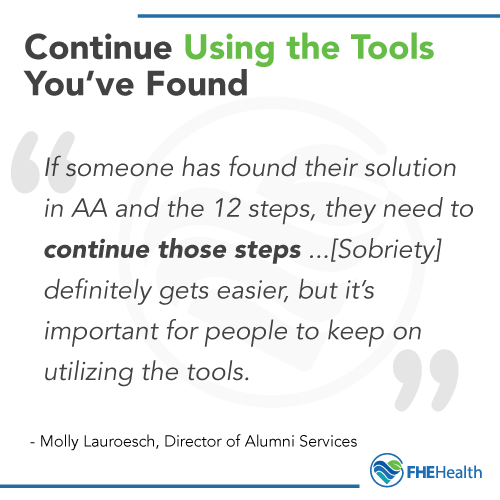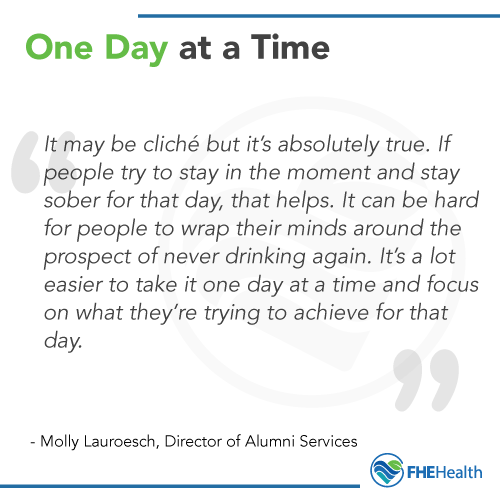
This article has been reviewed for accuracy by our peer review team which includes clinicians and medical professionals. Learn more about our peer review process.
Recovering from drug or alcohol addiction isn’t easy. That’s because it’s as much about successfully staying sober as it is about getting sober— and just the concept of staying sober can seem incredibly daunting for anyone fresh out of rehab. It’s no surprise, then, that many people in early recovery ask the question, “Does sobriety get easier over time?”
Thankfully, the answer to that question is “yes,” according to someone who is well-qualified to know: As the director of alumni for FHE Health, Molly Lauroesch regularly interfaces with FHE patients and those fresh out of rehab, so she is intimately familiar with their concerns. Among them: the worry that daily sobriety will always be characterized by intense cravings, intrusive thoughts, and white-knuckled attempts to avoid relapse. In a recent interview, Lauroesch shared some helpful advice and words of encouragement for anyone in that space who may be wondering whether sobriety gets easier with time….
How Sobriety Really Does Get Easier Over Time
 If it’s true that sobriety does get easier over time, how does sobriety get easier? Lauroesch pointed to several factors that make sobriety easier the longer you practice it:
If it’s true that sobriety does get easier over time, how does sobriety get easier? Lauroesch pointed to several factors that make sobriety easier the longer you practice it:
1. Going to rehab and finishing a program of addiction treatment can make newfound sobriety easier to sustain. The reason, according to Lauroesch, is that rehab removes patients from the environmental triggers and temptations that typically cause a drug or alcohol relapse.
“It’s helpful for patients to have that physical separation, in terms of being in an inpatient and/or outpatient setting,” Lauroesch said. “You’re in a structured environment. Often people have to drive past their go-to liquor store, which can be triggering; or they know they can connect with their drug dealer at work, so being tucked away in a separate environment is a big help.”
2. The longer you go without relapsing is another contributing factor, Lauroesch said. (That assertion is backed by research showing relapse rates significantly go down after one year of successful sobriety.) Speaking from experience, Lauroesch was quick to point out that intense cravings do gradually recede the longer you’re sober. As you continue to successfully work a program of recovery and live a healthy lifestyle, “you’re farther removed from that in your life … “The more distance you have away from the substance, the more you realize you really don’t need the alcohol and drugs to make it through life. You can go to a party knowing ‘that I don’t need alcohol, because it won’t do me any good.’”
As for when it’s safe to be around alcohol? “A lot of times people like to use the guideline of a year of sobriety before being around alcohol,” Lauroesch said, noting that she often counsels patients to give themselves a full year of self-care and sobriety before taking on a new relationship or other challenges to sobriety.
“If you can commit to one year of really taking yourself, it’s going to set yourself up well for the future,” she said.
With respect to assessing your readiness to be around alcohol, Lauroesch advocated taking an honest assessment of how “spiritually fit” you will be in that situation: “You can go anywhere alcohol is, so long as you’re spiritually fit to be in that situation,” she said. “There’s no reason you can’t take a trip to Las Vegas with your girlfriends, but if you’ve been struggling with thoughts of drinking, then the trip is not a good idea.”
 3. Staying active in a 12-step program like AA or NA can ease the daily struggle to stay sober, especially when that struggle is most intense during the first weeks and months of recovery. Lauroesch advocates getting involved in one of these “solution-based fellowships that encourage you to get a sponsor and go through the 12 steps”— the reason being that “the 12 steps are an evolution process … You go through a specific process to really get into your recovery.”
3. Staying active in a 12-step program like AA or NA can ease the daily struggle to stay sober, especially when that struggle is most intense during the first weeks and months of recovery. Lauroesch advocates getting involved in one of these “solution-based fellowships that encourage you to get a sponsor and go through the 12 steps”— the reason being that “the 12 steps are an evolution process … You go through a specific process to really get into your recovery.”
That process starts with “first admitting you’re an alcoholic,” and from there takes participants through a series of 11 more steps— all spiritual principles that are meant to be applied and practiced in one’s daily life. The 12 Steps include:
- admitting one’s powerlessness over drugs or alcohol;
- coming to believe that a Power greater than oneself can restore your sanity;
- deciding to turn one’s will and life over to the care of God as you understand God;
- making a searching and fearless moral inventory of oneself;
- admitting to God, oneself and another human being the exact nature of one’s wrongs;
- being ready to have God remove all these defects of character;
- humbling asking God/one’s Higher Power to remove one’s shortcomings;
- making a list of all persons one has harmed and becoming willing to make amends to them;
- making direct amends to such people where possible, except when to do so would injure them or others;
- continuing to take personal inventory and promptly admit when one is wrong;
- seeking through prayer and meditation to improve conscious contact with God/a Higher Power, praying only for knowledge of their will and the power to carry that out;
- having had a spiritual awakening as the result of these steps, trying to carry this message to other alcoholics/addicts and to practice these principles in all our affairs.
(See our 12-step series for more information)
“If someone has found their solution in AA and the 12 steps, they need to continue those steps,” Lauroesch said. ““[Sobriety] definitely gets easier, but it’s important for people to keep on utilizing the tools.” And research has revealed that relapse rates are lower for those who participate in these groups.
4. Utilizing the other recovery tools available to you that you personally find most helpful is also key, Lauroesch said, noting that it’s “a matter of personal exploration.” She said people should seek out what they’re comfortable with—”whether AA, a therapist, Smart recovery program or attending church groups.” Those aren’t the only supports available of course. In addition to AA/NA and individual therapy, Lauroesch recommended specialized group therapy, “because you’re dealing with a group of peers who are likely to share your same experience and can be open and honest with you regarding solutions.”
Lauroesch said that from her experience patients who have trauma backgrounds often find help and relief from EMDR therapy. For others, sobriety gets easier with the help of different therapeutic tools like mindfulness (yoga and meditation, for example) and through involvement in a church group.
Why Are the First 90 Days of Sobriety Vital?
 It is often said that the first 90 days of recovery are especially important. That’s because relapse rates tend to be highest within this window of time following detox. Here Lauroesch’s emphasis on how rehab is again relevant. Rehab programs usually range in length from 30 to 90 days. Research has shown that the longer your rehab program, the better your chances of successfully sustaining sobriety. The takeaway: that if you have the option, attending and completing a longer, 90-day program of rehab will make it much easier to stay sober in the longer run.
It is often said that the first 90 days of recovery are especially important. That’s because relapse rates tend to be highest within this window of time following detox. Here Lauroesch’s emphasis on how rehab is again relevant. Rehab programs usually range in length from 30 to 90 days. Research has shown that the longer your rehab program, the better your chances of successfully sustaining sobriety. The takeaway: that if you have the option, attending and completing a longer, 90-day program of rehab will make it much easier to stay sober in the longer run.
“One Day at a Time”
Embracing and living by the concept, “one day at a time,” makes it easier to stay sober, too. That’s a message of encouragement that Lauroesch often shares with those in early recovery. Here’s why:
“It may be cliché but it’s absolutely true. If people try to stay in the moment and stay sober for that day, that helps. It can be hard for people to wrap their minds around the prospect of never drinking again. It’s a lot easier to take it one day at a time and focus on what they’re trying to achieve for that day.”
In other words, tackling one day of sobriety is much more manageable than attempting to manage a lifetime of it.






